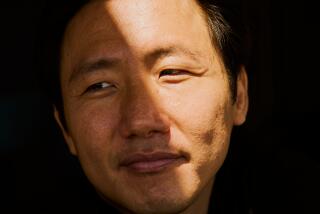John le Carré’s ‘Tinker, Tailor, Soldier, Spy’ reissued
During the writing of an early draft of “Tinker, Tailor, Soldier, Spy,” recalls John le Carré in an introduction to his classic spy novel, now reissued by Penguin Books along with a selection of his other works, he was banging his head against the wall. For a long time, he tried to make the story of a quest to ferret out a double agent in the British secret service succeed without flashbacks.
After months of frustration, Le Carré took the manuscript into his garden and burned it. Such is the diligence of the master craftsman. Then he went back to work with a new take. The version of the book that he completed and published in 1974 — now regarded as perhaps the greatest spy novel written — is so complex precisely because its form itself is a journey of exploration into the “inside-out logic of the double-agent operation,” into the past and into the complex natures of loyalty and betrayal.
The reader’s unlikely guide through these labyrinthine intricacies is George Smiley, a plodding, padding spy-as-bureaucrat who had featured in some way or another in several of Le Carré’s previous six novels, including the big bestseller “The Spy Who Came in From the Cold.” Here, in “Tinker, Tailor,” Smiley moves center stage with an altogether different aura; he’s a mournful aging hero as determinedly unglamorous as he is dogged and brilliant. Le Carré introduces him thus: “[H]e was by appearance one of London’s meek who do not inherit the earth. His legs were short, his gait anything but agile, his dress costly, ill-fitting, and extremely wet.”
Smiley’s overcoat has a “hint of widowhood” about it, and his serially unfaithful wife, the lovely Ann, says he looks like “an egg-cosy.” James Bond or Jason Bourne, Smiley is not. He’s presented to us as being out of favor, living in enforced retirement, shabbily treated as the result of a secret op botched by his former boss and mentor, a character known simply as “Control” who, in the latter stages of his career and life, became obsessed with the idea that the Soviets had turned his networks inside-out through the agency of a mole.
“Control” dies before he can prove his case and “The Circus,” Le Carré’s fictional MI6, passes into the hands of Smiley’s rivals and peers, Percy Alleline, Roy Bland, Toby Esterhase and the dashing Bill Haydon, who promptly kick Smiley out. Then, at the end of one awful humiliating day, Smiley is summoned to a meeting with a high-ranking politician, invited to listen to some new evidence that’s come along and asked to clean stables and root out the traitor.
“It’s the oldest question of all, George. Who can spy on the spies? Who can smell out the fox without running with him?” asks the politician, Oliver Lacon, described as “a string bean of a man, graceless and boyish.”
Le Carré, whose real name is David Cornwell, did indeed work for MI5 and MI6 in the 1950s and 1960s, and his stories have always come with a ballast of realism and authenticity. His real qualities as a writer, though, lie in a gift for plot and a zest for atmosphere.
On the one hand, “Tinker, Tailor’ is brilliantly of its time: The novel reeks of England in the early 1970s, of a dismal freezing winter, of a time when Britain was flailing and failing at the end of Empire yet still fighting the Cold War. And losing it.
On the other, the book offers insights into the nature of espionage that still ring true. Spies guard the national interest, ostensibly, and in their behavior, Le Carré argues, we see a nation’s character reflected. Is morality a question of the methods that the secret services use, or does the aim justify all? “Good intelligence work is gradual, and rests on a kind of gentleness,” Smiley notes, while even this most cerebral of spy stories comes with its measure of blunt violence. Undercover work leaves a bad taste in the mouth, even if it’s successful, and often it isn’t.
Sometimes Smiley reflects on all this and more, as if Le Carré were debating with himself on the moralities and necessities of spying. More often than not, though, Smiley sits there like a blank, watching and listening with his “hooded eyes: and “plump hands linked across his generous stomach.”
The inscrutable Alec Guinness famously embodied this character in a BBC TV series, and Gary Oldman, another actor who can seem like an empty suit in a closet, will do so in a feature film that’s set for release in the fall. Maybe George Smiley presents an irresistible challenger for a certain kind of actor — he’s a man almost without personality, and therefore the perfect spy.
Rayner is the author, most recently, of “A Bright and Guilty Place: Murder, Corruption, and L.A.’s Scandalous Coming of Age.”
More to Read
Sign up for our Book Club newsletter
Get the latest news, events and more from the Los Angeles Times Book Club, and help us get L.A. reading and talking.
You may occasionally receive promotional content from the Los Angeles Times.








